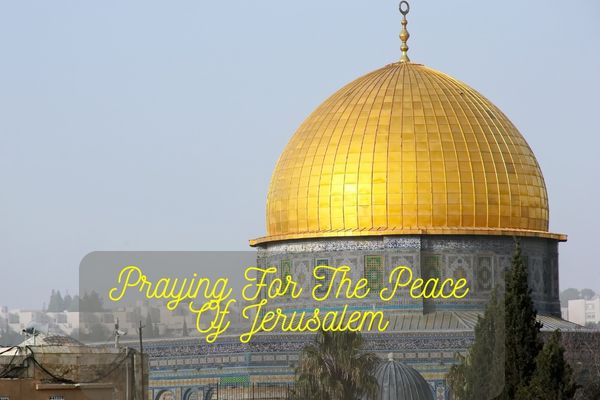Jerusalem, a city steeped in rich history, spirituality, and cultural significance, holds a special place in the hearts of people around the world. For centuries, it has been a focal point of religious devotion, conflict, and hope. Praying for the peace of Jerusalem is a sacred practice that transcends religious boundaries and serves as an invocation for harmony, unity, and healing in this cherished city. In this article, we explore the significance of praying for the peace of Jerusalem and the transformative power it holds.
Praying For The Peace Of Jerusalem
“Praying for the Peace of Jerusalem” is a phrase rooted in biblical and religious contexts, particularly within Christianity. It reflects a spiritual commitment to seek and intercede for the well-being, harmony, and prosperity of the city of Jerusalem. This practice finds its foundation in verses such as Psalm 122:6 (New International Version), which states, “Pray for the peace of Jerusalem: ‘May those who love you be secure.'”
The act of praying for the peace of Jerusalem is often associated with recognizing the historical, cultural, and religious significance of the city in various faith traditions. It signifies a heartfelt plea for stability, unity, and divine protection over Jerusalem, acknowledging its importance as a center for worship and a symbol of spiritual heritage.
Moreover, this act of prayer extends beyond religious realms and can carry geopolitical implications. It reflects a genuine aspiration for political stability and harmonious coexistence among the diverse communities residing within the city. Ultimately, the practice encapsulates a spiritual commitment to seek the well-being and prosperity of a city that holds profound significance in religious, historical, and cultural realms.
Why do we Pray for the Peace Of Jerusalem?
Praying for the peace of Jerusalem is rooted in religious, historical, and cultural significance, primarily within the context of Judeo-Christian traditions. Here are several reasons why individuals engage in this practice:
1. Biblical Mandate: The call to pray for the peace of Jerusalem is explicitly mentioned in the Bible, notably in Psalm 122:6, which states, “Pray for the peace of Jerusalem: ‘May those who love you be secure.'” For believers, this scriptural command serves as a spiritual directive to intercede for the well-being of the city.
2. Spiritual Heritage: Jerusalem holds immense spiritual importance in Judaism, Christianity, and Islam. It is revered as the city of David, the site of Solomon’s Temple, and the place where significant biblical events unfolded. Praying for its peace reflects a deep connection to the spiritual heritage embedded in the city’s history.
3. Unity and Harmony: Jerusalem is a city with diverse religious and cultural communities. Praying for its peace is a plea for unity, coexistence, and understanding among these communities. It expresses a desire for harmony and cooperation, transcending religious boundaries.
4. Prophetic Fulfillment: Some individuals pray for the peace of Jerusalem in anticipation of biblical prophecies related to the city’s role in eschatological events. The belief is that praying for peace aligns with God’s ultimate plan for Jerusalem’s future.
5. Geopolitical Stability: Beyond its religious significance, Jerusalem is a focal point in geopolitical discussions. Praying for its peace reflects a concern for political stability and the well-being of the people living in the region, emphasizing the importance of resolving conflicts peacefully.
6. Global Implications: Due to its historical and religious importance, events in Jerusalem often have far-reaching implications. Praying for its peace is a recognition that a harmonious Jerusalem can contribute to broader global stability and understanding.
7. Personal and Collective Well-Being: Individuals may pray for the peace of Jerusalem as an extension of their concern for the well-being of fellow humans. This practice reflects a broader commitment to fostering peace, justice, and prosperity for people living in the city.
Importance of praying for the peace of Jerusalem
The importance of praying for the peace of Jerusalem is profound and extends across religious, historical, and global dimensions. Here are key reasons highlighting the significance of this practice:
Spiritual Significance: Jerusalem holds paramount spiritual importance in Judaism, Christianity, and Islam. It is revered as a sacred city with deep historical connections to pivotal religious events. Praying for its peace reflects a commitment to the spiritual heritage embedded in the city’s foundations.
Biblical Mandate: The call to pray for the peace of Jerusalem is explicitly stated in the Bible, emphasizing its significance in Judeo-Christian traditions. Psalm 122:6 encourages believers to seek the well-being of the city, linking prayer to a scriptural mandate.
Symbol of Unity: Jerusalem is a city where diverse religious and cultural communities coexist. Praying for its peace is a symbolic gesture of unity, fostering an understanding that transcends religious and cultural boundaries. It reflects a collective aspiration for harmony among the city’s inhabitants.
Historical Heritage: Jerusalem is a repository of historical treasures, including ancient sites, religious landmarks, and archaeological wonders. Praying for its peace acknowledges the importance of preserving this shared heritage for future generations.
Global Implications: Due to its historical and religious significance, events in Jerusalem often have global repercussions. Praying for its peace is a recognition that a stable Jerusalem contributes to regional and global stability, affecting diplomatic, political, and social dynamics.
Humanitarian Concern: Beyond religious and geopolitical considerations, praying for the peace of Jerusalem reflects a genuine concern for the well-being of the people living in the city. It underscores a humanitarian commitment to the safety, security, and prosperity of the individuals residing in Jerusalem.
Path to Understanding: Jerusalem is a city with a complex history, marked by periods of conflict and tension. Praying for its peace signifies a hope for resolution, dialogue, and understanding among communities. It acknowledges the importance of peaceful coexistence for the city’s residents.
Conclusion
Praying for the peace of Jerusalem is a profound act of faith, compassion, and hope. It transcends religious boundaries and calls upon individuals to cultivate unity, healing, and reconciliation. By invoking blessings upon this sacred city, we contribute to the collective consciousness of peace, fostering an environment where diverse communities can coexist harmoniously.




